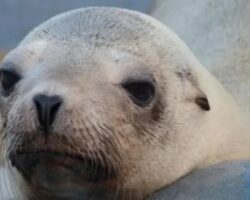Officials in California warn that aggressive sea lions are caused by toxic algae.

California authorities and natural life specialists are asking beachgoers over the lengthy Fourth of July occasion end of the week to be aware of wiped out ocean lions showing abnormally forceful way of behaving towards individuals.
What drives the news: Channel Islands Marine and Untamed life Organization (CIMWI) leader chief Sam Dover told Axios seven ocean lions that had become sick to neurotoxins from seaward green growth sprouts had chomped three beachgoers, two surfers, one oar guest and a jumper as of Saturday.
“There have additionally been a few nibbles in Los Angeles Province too,” Dover said in an email, as authorities prepared for a flood of beachgoers over the July Fourth weekend during California’s most memorable significant intensity wave of 2023.
Orange Area Parks authorities put signs at Salt Rivulet and Strands sea shores last week after two individuals were harmed via ocean lions impacted by domoic corrosive from the sprouts, per NBC News.
The 10,000 foot view: Many ocean lions have been cleaning up debilitated or dead from the sprouts on sea shores in Focal and Southern California since May.
Marine Warm blooded creature Care Center President John Warner said last week that while normally happening destructive algal blossom (HAB) occasions are the same old thing, the not-for-profit salvage association was answering “an exceptional number of creatures” becoming sick this year.
What’s in store: In an email to Axios, Giancarlo Rulli, a spokesperson for the Marine Mammal Center, stated that when exposed to domoic acid poisoning, sea lions can exhibit a variety of behaviors.
“Lethargy, disorientation, unpredictable and/or aggressive behavior” are examples of this.
According to Rulli, it is essential for people to maintain a safe distance of at least fifty yards from any sea lion, regardless of whether it is afflicted with the disease, and they should not interact with the animal.
“It’s critical that beachgoers instead check who your local wildlife first responder is (depending on which county), call to report, and let the trained experts determine whether a response is necessary,” Rulli added. “It’s also critical that beachgoers call to report.”
The context: According to the CIMWI, “environmental conditions such as climate change and an increase in nutrient pollution are potentially causing HABs to occur more frequently and in locations that were not previously affected.”
“El Niño brings warm water conditions that can advance higher harmful green growth blossoms.”
Behind the scenes: According to Rulli, demoic acid “accumulates in small fish, like sardines and anchovies, which are then eaten in large quantities by sea lions.”
“Domoic corrosive goes after the mind and the heart causing seizures and cardiovascular breakdown. Whenever left untreated, it for the most part causes super durable cerebrum harm,” he said.
“Sea lions repeatedly exposed to the toxin will suffer longer-lasting and more serious effects,” Rulli added. “The toxin will naturally flush from an animal’s system over time.”
According to Rulli, “experts are often able to help flush the toxin from their systems by giving them fluids” fish that are free of domoic acid and anti-seizure medications. “If these animals come into care before significant damage occurs.”

